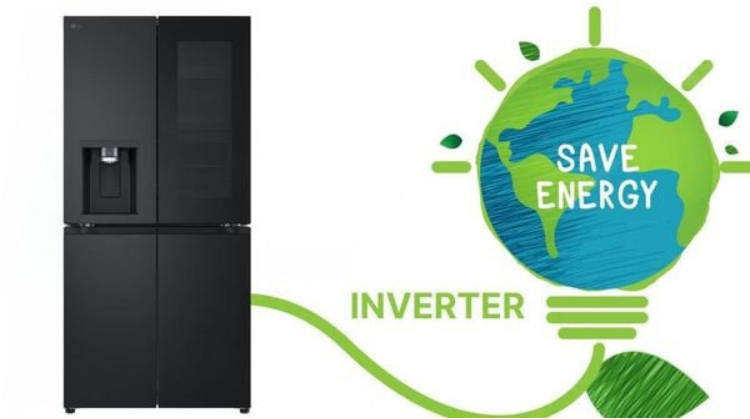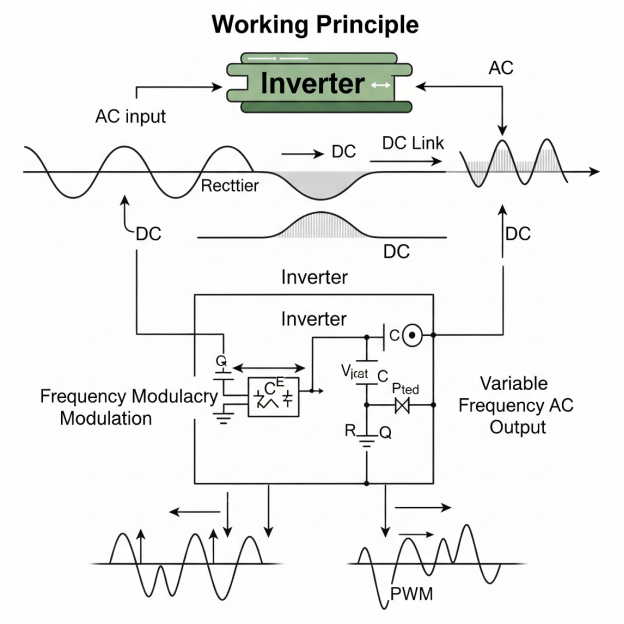In an era where energy costs are constantly on the rise and environmental consciousness is growing, finding ways to make our homes more energy-efficient has become a top priority. Among the myriad of innovations aimed at reducing power consumption, Inverter technology stands out as a true game-changer. But what exactly is Inverter technology, and how does it deliver such remarkable savings? Let's delve deep into this ingenious innovation and understand why it's becoming a cornerstone of modern appliances.

What Exactly is Inverter Technology?
At its core, Inverter technology, also known as variable frequency drive (VFD) technology, is an intelligent electronic control system designed to regulate the speed of an electric motor or compressor. Unlike traditional appliances that operate with a simple ON/OFF mechanism at a fixed speed, Inverter-driven devices can dynamically adjust their power output to match the precise demands of the moment.
Think of it this way: a conventional car engine might only have two modes – full throttle or off. An Inverter-equipped car, however, can smoothly adjust its speed from a gentle crawl to a brisk pace, optimizing fuel consumption at every point. This continuous adjustment is key to its efficiency.
The Ingenious Mechanism: How Inverter Technology Works

The underlying principle of Inverter technology involves sophisticated control over the electrical current supplied to the motor or compressor:
1.AC to DC Conversion: The alternating current (AC) from your home's power supply is first rectified and filtered to convert it into direct current (DC).
2.Frequency and Voltage Modulation: This DC current is then fed into an inverter circuit, which uses a series of high-speed electronic switches (often IGBTs - Insulated Gate Bipolar Transistors) to convert it back into AC. Crucially, the inverter can vary the frequency and voltage of this newly generated AC current.
3.Dynamic Power Output: A sophisticated microprocessor acts as the brain of the system. It continuously monitors various factors, such as the desired temperature, ambient temperature, humidity levels, and even the number of occupants in a room (for air conditioners). Based on these inputs, the microprocessor precisely controls the frequency and voltage of the AC current supplied to the motor or compressor.
o When high performance is needed (e.g., rapid cooling upon startup), the inverter increases the frequency and voltage, allowing the motor/compressor to run at maximum speed.
o Once the desired conditions are met (e.g., the room reaches the set temperature), the inverter reduces the frequency and voltage, slowing down the motor/compressor to just the right speed to maintain the stable temperature without ever fully shutting off.
This continuous, precise regulation – rather than intermittent on-off cycling – is the secret to Inverter technology's superior efficiency and performance.
The "Golden" Benefits of Embracing Inverter Technology
The adoption of Inverter technology in household appliances isn't just about having a fancy feature; it's a smart investment that delivers tangible benefits:
Unparalleled Energy Savings
This is undoubtedly the most compelling advantage. Because Inverter devices avoid constant stopping and restarting (which consumes a significant amount of power), they use considerably less electricity. Depending on the appliance type and usage patterns, you can expect energy savings ranging from 30% to as much as 60% compared to non-Inverter models. This translates directly into noticeably lower electricity bills month after month, making the initial investment well worth it.
Whisper-Quiet Operation and Enhanced Durability
The continuous, modulated operation of Inverter motors and compressors reduces wear and tear significantly. Without the jarring jolts of constant start-ups and shut-downs, the mechanical stress on components is minimized. As a result, Inverter appliances operate with remarkably lower noise levels, creating a more peaceful and comfortable living environment. Furthermore, this reduced stress directly contributes to a longer lifespan for the appliance, leading to fewer breakdowns and lower maintenance cost over time.
Consistent and Comfortable Temperature Control
Inverter technology excels at maintaining precise and stable temperatures. In an air conditioner, this means no more uncomfortable temperature swings – you get a consistently cool environment without feeling too cold or too warm. For refrigerators and freezers, stable temperatures ensure food stays fresher for longer, reducing waste and preserving nutrient content. This precise control enhances overall user comfort and the effectiveness of the appliance.
Faster Cooling or Heating Capabilities
When initial rapid cooling or heating is required, Inverter devices can operate at a higher capacity to quickly reach the desired temperature. Once that set point is achieved, they seamlessly dial back their power to maintain it efficiently. This responsiveness means you get to enjoy the benefits faster, whether it's a cool room on a hot day or perfectly chilled beverages.
Environmentally Friendly
Beyond personal savings, choosing Inverter appliances also benefits the planet. Their reduced energy consumption directly translates to a lower carbon footprint, helping to decrease greenhouse gas emissions and conserve valuable energy resources. It's a choice that's good for your wallet and good for the Earth.
Common Appliances Where Inverter Technology Shines
Today, Inverter technology has become a standard feature in many essential home appliances:
Inverter Air Conditioners: Offering superior cooling, stable room temperatures, and significant energy savings, they are a staple in modern homes.
Inverter Refrigerators & Freezers: Keep food fresher for longer with consistent temperatures, consume less electricity, and operate quietly. Brands like Sanaky are well-known for their energy-efficient Inverter freezers and chillers, especially popular in commercial settings.
Inverter Washing Machines: Provide quieter operation, improved durability, and efficient use of both electricity and water.
Inverter Microwave Ovens: Offer more precise power delivery for even cooking and defrosting results.
Is Investing in Inverter Appliances Worth It?
While the upfront c ost of Inverter-equipped appliances might be slightly higher than their conventional counterparts, the long-term benefits far outweigh this initial investment. The substantial energy savings, enhanced durability, quieter operation, and superior comfort they provide quickly amortize the extra cost through reduced utility bills and fewer repair needs.
If you're looking for a smart, sustainable way to lower your household expenses and enjoy a more comfortable, convenient living environment, prioritizing appliances with Inverter technology is an excellent decision. It's an investment that pays dividends, both for your wallet and for the planet.
. --------------------------------------------------------------------------------------------------------------
SANAKY VIETNAM., CO LTD - Manufacturer of Chest Freezer - Upright Cooler, Transformer, RO Water Purifier...
 Vietnamese
Vietnamese  English
English  Chinese
Chinese  French
French  Spanish
Spanish  Russian
Russian  Arabic
Arabic  Portuguese
Portuguese